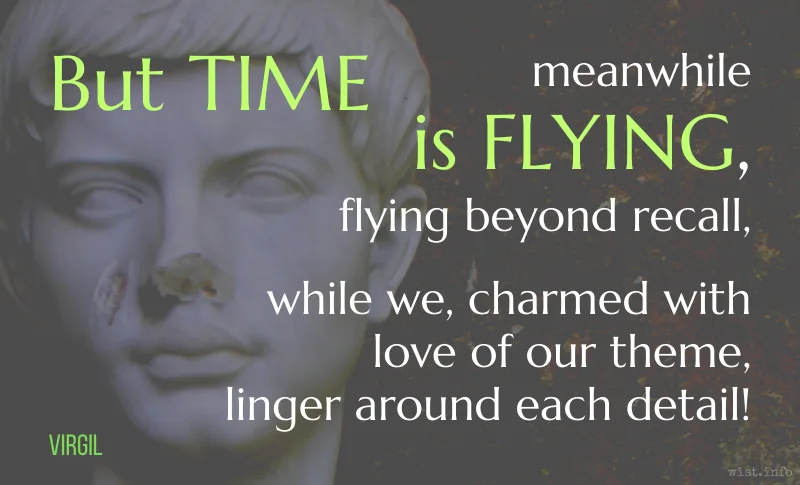The world would be much better off if the pains taken to analyze the subtlest moral laws were given to the practice of the simplest.
[Es stände besser um die Welt, wenn die Mühe, die man sich gibt, die subtilsten Moralgesetze auszuklüglen, zur Ausübung der einfachsten angewendet würde.]
Marie von Ebner-Eschenbach (1830-1916) Austrian writer
Aphorisms [Aphorismen], No. 104 (1880) [tr. Wister (1883)]
(Source)
(Source (German)). Alternate translation:The world would be in better shape if people would take the same pains in the practice of the simplest moral laws as they exert in intellectualizing over the most subtle moral questions.
[tr. Scrase/Mieder (1994)]
Quotations about:
trivia
Note not all quotations have been tagged, so Search may find additional quotes on this topic.
Never get a reputation for a small perfection, if you are trying for fame in a loftier area; the world can only judge by generals, and it sees that those who pay considerable attention to minutiæ, seldom have their minds occupied with great things. There are, it is true, exceptions; but to exceptions the world does not attend.
Edward George Bulwer-Lytton (1803-1873) English novelist and politician
The Disowned, ch. 2 [Talbot] (1828)
(Source)
See La Rochefoucauld.
A shrewd man has to arrange his interests in order of importance and deal with them one by one; but often our greed upsets this order and makes us run after so many things at once that through over-anxiety to have the trivial we miss the most important.
[Un habile homme doit régler le rang de ses intérêts et les conduire chacun dans son ordre. Notre avidité le trouble souvent en nous faisant courir à tant de choses à la fois que, pour désirer trop les moins importantes, on manque les plus considérables.]
François VI, duc de La Rochefoucauld (1613-1680) French epigrammatist, memoirist, noble
Réflexions ou sentences et maximes morales [Reflections; or Sentences and Moral Maxims], ¶66 (1665-1678) [tr. Tancock (1959)]
(Source)
Present in the first, 1665 edition in a slightly longer form:Un habile homme doit savoir régler le rang de ses intérêts et les conduire chacun dans son ordre. Notre avidité le trouble souvent en nous faisant courir à tant de choses à la fois que, pour désirer trop les moins importantes, nous ne les faisons pas assez servir à obtenir les plus considérables.
(Source (French)). Alternate translations:In this the prudent man is distinguishable from the imprudent, that he regulates his interests, and directs them to the prosecution of his designs each in their order. Our earnestness does many times raise a disturbance in them, by hurrying us after a hundred things at once. Thence it proceeds, that out of an excessive desire of the less important, we do not what is requisite for the attainment of the most considerable.
[tr. Davies (1669), ¶165]A wise Man should order his Designs, and set all his Interests in their proper places. This Order is often disturbed by a foolish greediness, which, while it puts us upon pursuing several things at once, makes us eager for matters of less consideration; and while we grasp at trifles, we let go things of greater Value.
[tr. Stanhope (1694), ¶67]An able man will arrange his interests, and conduct each in its proper order. Our greediness often hurts us, by making us prosecute so many things at once; by too earnestly desiring the less considerable, we lose the more important.
[pub. Donaldson (1783), ¶205; ed. Lepoittevin-Lacroix (1797), ¶65]An able man will arrange his respective interests;, and conduct each in its proper order. Ambition is often injurious, by tempting us to prosecute too much at once. By earnestly desiring the less considerable, we lose the more important.
[ed. Carville (1835), ¶473]A clever man should regulate his interests, and place them in proper order. Our avidity often deranges them by inducing us to undertake too many things at once; and by grasping at minor objects, we lose our hold of more important ones.
[ed. Gowens (1851), ¶67]A clever man ought to so regulate his interests that each will fall in due order. Our greediness so often troubles us, making us run after so many things at the same time, that while we too eagerly look after the least we miss the greatest.
[tr. Bund/Friswell (1871)]A wise man co-ordinates his interests, and develops them according to their merits. Cupidity defeats its own ends by following so many at once that in our greed for trifles we lose sight of important matters.
[tr. Heard (1917)]A clever man will know how to range his interests, and will pursue each according to its merits. Our greed, however, will often confuse our method; for we run after so many things at once that we frequently miss what is of importance in pursuit of what is negligible.
[tr. FitzGibbon (1957)]Clever men should arrange their desires in the proper order and seek each in turn. In our eagerness we often attempt too many things at once, and by striving too much after the small ones we lose the big.
[tr. Kronenberger (1959)]A wise man ought to arrange his interests in their true order of importance. Our greed often disturbs this order by making us pursue so many things at once that, for too much desiring the least important, we miss those that are most so.
[tr. Whichello (2016)]
Pedantry crams our heads with learned lumber, and takes out our brains to make room for it.
Charles Caleb "C. C." Colton (1780-1832) English cleric, writer, aphorist
Lacon: Or, Many Things in Few Words, Vol. 2, § 20 (1822)
(Source)
People who are too much concerned with little things usually become incapable of big ones.
[Ceux qui s’appliquent trop aux petites choses deviennent ordinairement incapables des grandes.]François VI, duc de La Rochefoucauld (1613-1680) French epigrammatist, memoirist, noble
Réflexions ou sentences et maximes morales [Reflections; or Sentences and Moral Maxims], ¶41 (1665-1678) [tr. Kronenberger (1959)]
(Source)
Present from the 1665 edition. See here for more discussion (English).
(Source (French)). Alternate translations:They that use to employ their minds too much upon Trifles, commonly make themselves incapable of any thing that is serious or great.
[tr. Stanhope (1694), ¶42]Those who apply themselves too much to little things, commonly become incapable of great ones.
[pub. Donaldson (1783), ¶38; ed. Lepoittevin-Lacroix (1797), ¶41]]Those who apply themselves much to little things, commonly become incapable of great ones.
[ed. Carville (1835), ¶35]Those who bestow too much application on trifling things, become generally incapable of great ones.
[ed. Gowens (1851), ¶42]Those who apply themselves too closely to little things often become incapable of great things.
[tr. Bund/Friswell (1871)]Undue attention to details tends to unfit us for greater enterprises.
[tr. Heard (1917)]Too close attention to trifles generally breeds incapacity in matters of moment.
[tr. Stevens (1939)]Men too involved in details usually become unable to deal with great matters.
[tr. FitzGibbon (1957)]People too much taken up with little things usually become incapable of big ones.
[tr. Tancock (1959)]Those who apply themselves too much to little things, ordinarily become incapable of great ones.
[tr. Whichello (2016)]
But time meanwhile is flying, flying beyond recall, while we, charmed with love of our theme, linger around each detail!
[Sed fugit interea, fugit inreparabile tempus,
singula dum capti circumvectamur amore.]Virgil (70-19 BC) Roman poet [b. Publius Vergilius Maro; also Vergil]
Georgics [Georgica], Book 3, l. 284ff (3.284-285) (29 BC) [tr. Fairclough (Loeb) (1916)]
(Source)
After a lengthy description of the springtime mating habits of wild animals and horses, Virgil basically saying, "But I digress ..." (and, a bit more directly, "And there's fifteen minutes you're never getting back").
Origin of the phrase tempus fugit ("time flies").
(Source (Latin)). Alternate translations:But time irreparable hastes away.
Whil'st we with love transported waste the day.
[tr. Ogilby (1649)]But time is lost, which never will renew,
While we too far the pleasing Path pursue;
Surveying Nature, with too nice a view.
[tr. Dryden (1709), l. 448ff]But, while love's copious themes our course delay,
Time flits, irrevocably flits away.
[tr. Nevile (1767), l. 337]But time irreparable flies away,
While in the maze of love we fondly stray.
[tr. Sotheby (1800)]But time flies meanwhile, flies irretrievable, while we, enamoured [of the theme], minutely trace particulars.
[tr. Davidson (1854)]But time is flying, flying, and for aye,
And we, love's prisoners, on his circuit stray.
[tr. Blackmore (1871)]But time meanwhile is flying, flying past recall, while, enamoured of our voyage, we are coasting every point.
[tr. Wilkins (1873)]Fast flies meanwhile the irreparable hour,v
As point to point our charmed round we trace.
[tr. Rhoades (1881)]But lo! while we of love seductive sing,
Time onward flies, nor stays his restless wing.
[tr. King (1882), l. 293ff]But meanwhile Time, Time that cannot be recalled, is fleeting, while enamored of my theme I enter into all details.
[tr. Bryce (1897)]But time fleets meanwhile, fleets beyond recovery, while in loving enthrallment we pass on and on.
[tr. Mackail (1899)]But the time meanwhile is fleeting, is fleeting past recall,
While we hover around each flower of the field that holds us in thrall.
[tr. Way (1912)]But time runs by, irreparable time.
As mastered by my subject's charm, I course
Slowly from point to point.
[tr. Williams (1915)]But time is on the move still, time that will not return,
While we go cruising around this subject whose lore delights us.
[tr. Day-Lewis (1940)]But time slides past, slides past beyond recall,
While, spellbound, we drift off among details.
[tr. Bovie (1956)]But meantime it escapes us, time, never to be recaptured, escapes us while we linger over details, captivated by love. [tr. Miles (1980)]But time is flying, flying beyond recall.
While captivated I linger lovingly,
Touring from this to that.
[tr. Wilkinson (1982)]But meanwhile time flies, flies irretrievably,
while, captivated by passion, I describe each detail.
[tr. Kline (2001)]But meanwhile time flies, it flies beyond recovery
while, captive to each fact, we are carried away by love.
[tr. Lembke (2004)]Meanwhile, it flies, time flies irretrievably,
while captivated with love we ramble through minutiae.
[tr. Johnson (2009)]But meanwhile uncoverable time
Is flying, flying past us while we linger,
Enraptured by our theme.
[tr. Ferry (2015)]
I believe that thousands of men would be orthodox enough in certain points, if divines had not been too curious, or too narrow, in reducing orthodoxy within the compass of subtleties, niceties, and distinctions, with little warrant from Scripture, and less from reason or good policy.
Many see the trees but not the forest, or bark up the wrong tree, speaking endlessly, reasoning uselessly, without getting to the heart of the matter. They go round and round, tiring themselves and us, and never get to what is important. This happens to people with confused minds who do not know how to clear away the brambles. They waste time and patience on what it would be better to leave alone, and later there is no time for what they left.
[Vanse muchos o por las ramas de un inútil discurrir, o por las hojas de una cansada verbosidad, sin topar con la sustancia del caso. Dan cien vueltas rodeando un punto, cansándose y cansando, y nunca llegan al centro de la importancia. Procede de entendimientos confusos, que no se saben desembarazar. Gastan el tiempo y la paciencia en lo que habían de dejar, y después no la hay para lo que dejaron.]
Baltasar Gracián y Morales (1601-1658) Spanish Jesuit priest, writer, philosopher
The Art of Worldly Wisdom [Oráculo Manual y Arte de Prudencia], § 136 (1647) [tr. Maurer (1992)]
(Source)
(Source (Spanish)). Alternate translations:Many fetch a tedious compass of words, without ever coming to the knot of the business: they make a thousand turnings and windings, that tire themselves and others, without ever arriving at the point of importance. And that proceeds from the confusion of their understanding, which cannot clear it self. They lose time and patience in what ought to be let alone, and then they have no more to bestow upon what they have omitted.
[Flesher ed. (1685)]Many lose their way either in the ramifications of useless discussion or in the brushwood of wearisome verbosity without ever realising the real matter at issue. They go over a single point a hundred times wearying themselves and others and yet never touch the all important centre of affairs. This comes from a confusion of mind from which they cannot extricate themselves. They waste time and patience on matters they should leave alone and cannot spare them afterwards for what they have left alone.
[tr. Jacobs (1892)]Most roam around, in useless millings either about the edge, or in the scrub of a tiresome verbosity, without striking upon the substance of the matter, they make a hundred turns about a point, wearying themselves, and wearying others, yet never arriving at the centre of what is important,- it is the product of a scattered brain that does not know how to get itself together,- they spend time, and exhaust patience, over that which they should leave alone, and afterwards are short of both for what they did leave alone.
[tr. Fischer (1937)]
I do not approve the maxim which desires a man to know a little of everything. Superficial knowledge, knowledge without principles, is almost always useless and sometimes harmful knowledge.
Luc de Clapiers, Marquis de Vauvenargues (1715-1747) French moralist, essayist, soldier
Reflections and Maxims [Réflexions et maximes] (1746) [tr. Lee (1903)]
(Source)
‘Tis hard bewildering riddles to compose
And labour lost to work at nonsense prose.[Turpe est difficiles habere nugas,
Et stultus labor est ineptiarum.]Martial (AD c.39-c.103) Spanish Roman poet, satirist, epigrammatist [Marcus Valerius Martialis]
Epigrams [Epigrammata], Book 2, epigram 86 (2.86.9-10) (AD 86) [tr. Francis & Tatum (1924), #105]
(Source)
Discussing writing elaborate or highly stylized poetry forms. (Source (Latin)). Alternate translations:Disgraceful 't is unto a poet's name
Difficult toys to make his highest am:
The labour's foolish that doth rack the brains
For things have nothing in them, but much pains.
[tr. Killigrew (1695)]How foolish is the toil of trifling cares.
[tr. Johnson (1750); he credits the translation Elphinston]How pitifull the boast of petty feats!
How idle is the toil of mean conceits!
[tr. Elphinston (1782), 2.76]It is disgraceful to be engaged in difficult trifles; and the labour spent on frivolities is foolish.
[tr. Amos (1858), 2.19]It is absurd to make one's amusements difficult; and labor expended on follies is childish.
[tr. Bohn's Classical (1859)]'Tis mean and foolish to assign
Long care and pains to trifles light.
[tr. Webb (1879)]Disgraceful ’tis to treat small things as difficult;
‘Tis silly to waste time on foolish trifles.
[ed. Harbottle (1897)]'Tis degrading to undertake difficult trifles; and foolish is the labour spent on puerilities.
[tr. Ker (1919)]'Tis hard bewildering riddles to compose
And labor lost to work at nonsense prose.
[tr. Francis & Tatum (1924)]It's demeaning to make difficulties out of trifles, and labor over frivolities is foolish.
[tr. Shackleton Bailey (1993)]It is absurd to make trifling poetry difficult, and hard work on frivolities is foolish.
[tr. Williams (2004)]
The Latin phrase was used by Addison as the epigram of The Spectator #470 (29 Aug 1712).
Religious discord has lost her sting; the cumbrous weapons of theological warfare are antiquated: the field of politics supplies the alchymists of our times with materials of more fatal explosion, and the butchers of mankind no longer travel to another world for instruments of cruelty and destruction. Our age is too enlightened to contend upon topics, which concern only the interests of eternity; and men who hold in proper contempt all controversies about trifles, except such as inflame their own passions, have made it a common-place censure against your ancestors, that their zeal was enkindled by subjects of trivial importance; and that however aggrieved by the intolerance of others, they were alike intolerant themselves. Against these objections, your candid judgment will not require an unqualified justification; but your respect and gratitude for the founders of the State may boldly claim an ample apology. The original grounds of their separation from the church of England, were not objects of a magnitude to dissolve the bonds of communion; much less those of charity, between Christian brethren of the same essential principles.
Notoriously insensitive to subtle shifts in mood, children will persist in discussing the color of a recently sighted cement-mixer long after one’s interest in the topic has waned.
Fran Lebowitz (b. 1950) American journalist
“Children: Pro or Con,” Metropolitan Life (1978)
(Source)
You can judge a leader by the size of the problem he tackles — people nearly always pick a problem their own size, and ignore or leave to others the bigger or smaller ones. The chief executive should be thinking about the long-term changes which will bring growth or decay to different parts of the enterprise, not fussing over day-to-day problems. Other people can cope with the waves, it’s his job to watch the tide.
Every religion consists of moral precepts, & of dogmas. In the first they all agree. All forbid us to murder, steal, plunder, bear false witness Etc. and these are the articles necessary for the preservation of order, justice, & happiness in society. In their particular dogmas all differ; no two professing the same. These respect vestments, ceremonies, physical opinions, & metaphysical speculations, totally unconnected with morality, & unimportant to the legitimate objects of society. Yet these are the questions on which have hung the bitter schisms of Nazarenes, Socinians, Arians, Athanasians in former times, & now of Trinitarians, Unitarians, Catholics, Lutherans, Calvinists, Methodists, Baptists, Quakers Etc. Among the Mahometans we are told that thousands fell victims to the dispute whether the first or second toe of Mahomet was longest; & what blood, how many human lives have the words ‘this do in remembrance of me’ cost the Christian world!
We all agree in the obligation of the moral precepts of Jesus: but we schismatize & lose ourselves in subtleties about his nature, his conception maculate or immaculate, whether he was a god or not a god, whether his votaries are to be initiated by simple aspersion, by immersion, or without water; whether his priests must be robed in white, in black, or not robed at all; whether we are to use our own reason, or the reason of others, in the opinions we form, or as to the evidence we are to believe. It is on questions of this, & still less importance, that such oceans of human blood have been spilt, & whole regions of the earth have been desolated by wars & persecutions, in which human ingenuity has been exhausted in inventing new tortures for their brethren.
It is time then to become sensible how insoluble these questions are by minds like ours, how unimportant, & how mischievous; & to consign them to the sleep of death, never to be awakened from it. The varieties in the structure & action of the human mind, as in those of the body, are the work of our creator, against which it cannot be a religious duty to erect the standard of uniformity.
Thomas Jefferson (1743-1826) American political philosopher, polymath, statesman, US President (1801-09)
Letter (1809-09-27) to James Fishback [draft]
(Source)
Jefferson seriously dialed back his actual response, though he kept both in his files; the final letter read, in this passage:The interests of society require the observation of those moral precepts only in which all religions agree, (for all forbid us to murder, steal, plunder, or bear false witness.) and that we should not intermeddle with the particular dogmas in which all religions differ, and which are totally unconnected with morality. in all of them we see good men, & as many in one as another. The varieties in the structure & action of the human mind as in those of the body, are the work of our creator, against which it cannot be a religious duty to erect the standard of uniformity.
Great merit, or great failings, will make you be respected or despised; but trifles, little attentions, mere nothings, either done or neglected, will make you either liked or disliked, in the general run of the world.
Lord Chesterfield (1694-1773) English statesman, wit [Philip Dormer Stanhope]
Letter to his son, #187 (20 Jul 1749)
(Source)
Unless we can extensively program our behavior, we waste tremendous amounts of information-processing capacity on trivia. This is why we form habits. Watch a committee break for lunch and then return to the same room: almost invariably its members seek out the same seats they occupied earlier. … Choosing the same seat spares us the need to survey and evaluate other possibilities.
It is only a step from victory to disaster. My experience is that, in a crisis, some detail always decides the issue.
Napoleon Bonaparte (1769-1821) French emperor, military leader
Letter to Tallyrand (7 Oct 1797)
(Source)
Napoleon's Letters [tr. J. M. Thompson (1934)]






















